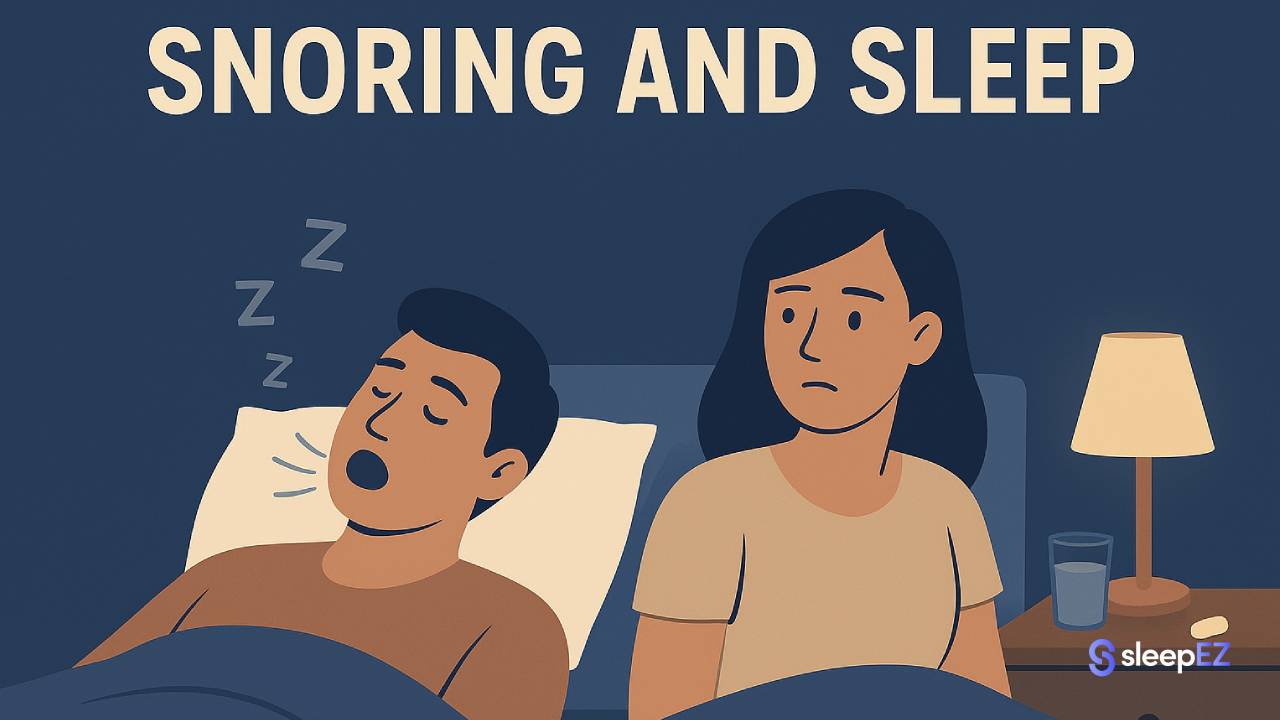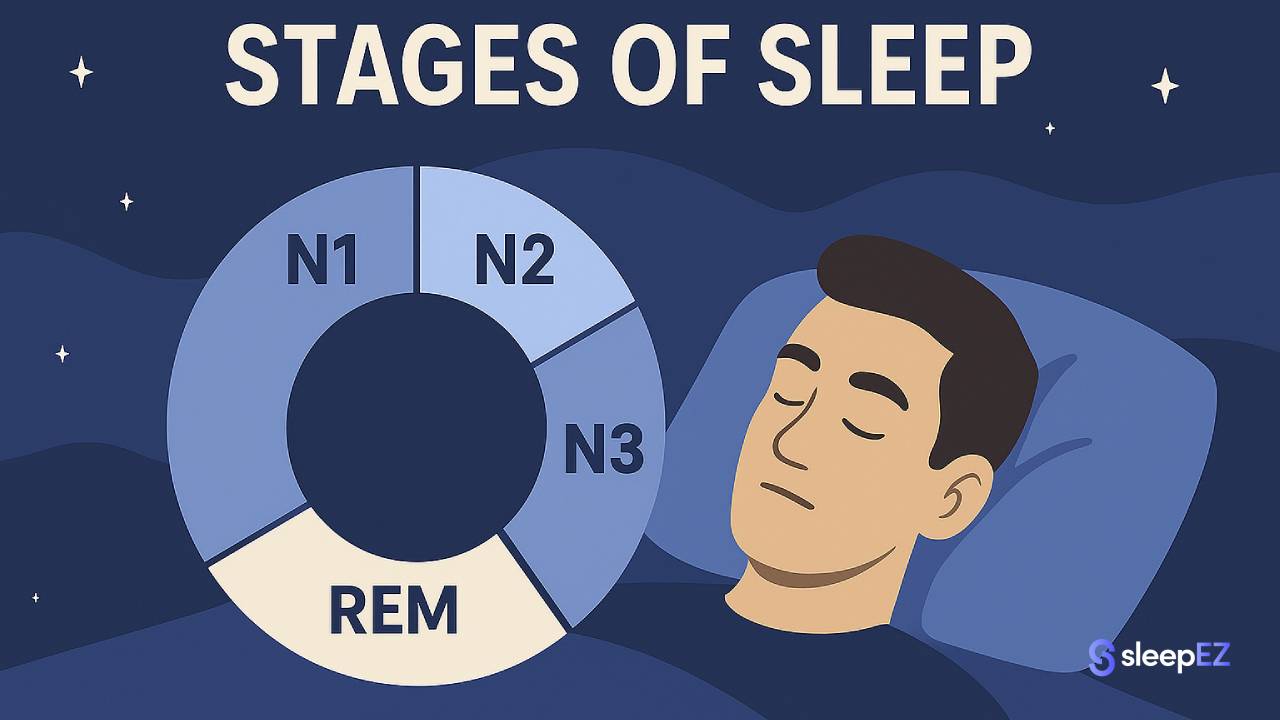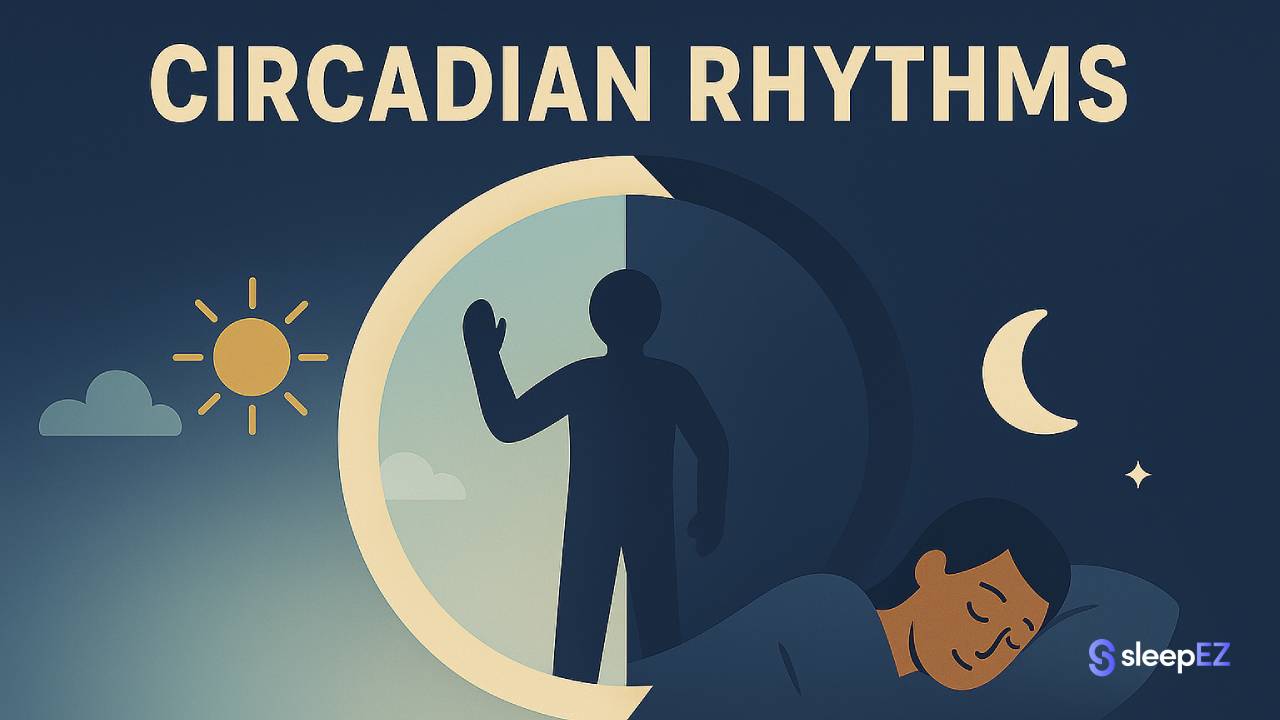Snoring is a sound caused by vibrating tissues in a narrowed airway during sleep. For many people, it's just an annoying noise that disrupts their partner's rest. For others, it signals a serious health condition that needs attention.
This guide will help you understand what causes snoring, when it becomes a medical concern, and what you can do to fix it.
What Causes Snoring?
Snoring happens when something blocks or narrows your airway while you sleep. The air squeezes through the tight space and makes the tissues in your throat vibrate.
Common causes include:
- Sleep Position: Sleeping on your back lets gravity pull your tongue backward, blocking your airway
- Mouth Breathing: Breathing through your mouth changes airflow and can cause throat tissues to vibrate
- Nasal Congestion: A stuffy nose forces you to breathe through your mouth
- Alcohol & Sedatives: These relax your throat muscles too much
- Excess Body Weight: Extra tissue around your neck can squeeze your airway
- Anatomy of Your Mouth & Throat: Some people naturally have a thicker soft palate, larger tonsils, or longer uvula
Who Snores? Snoring Can Affect Anyone
While often associated with older men, snoring can affect anyone at any age, including women and children.
Snoring in Women: Hormonal changes during pregnancy and menopause can relax throat muscles and sometimes lead to snoring. Women may also start snoring or snore more after menopause.
Snoring in Children: Occasional light snoring in children is normal. But persistent and loud snoring should be discussed with a pediatrician. It can be linked to enlarged tonsils or adenoids that block the airway.
Is Your Snoring a Sign of Sleep Apnea?
This is the most important question for any chronic snorer.
Snoring by itself is usually harmless. But when paired with certain symptoms, it can signal obstructive sleep apnea (OSA), a condition where your breathing repeatedly stops and starts during sleep.
You might have sleep apnea if your snoring is paired with:
- Pauses in breathing while sleeping (observed by a partner)
- Gasping, choking, or snorting sounds at night
- Excessive daytime sleepiness or fatigue
- Morning headaches
- Difficulty concentrating during the day
- Waking up with a dry mouth or sore throat
What's the Difference Between Normal Snoring and Sleep Apnea?
Normal snoring has a steady, rhythmic sound. The person breathes continuously through the night, even if noisily.
Sleep apnea snoring is interrupted by periods of silence. These quiet moments happen when breathing stops completely. They're followed by gasps, snorts, or choking sounds as the person's body struggles to breathe again.
When to See a Doctor
If you experience any of the symptoms in the checklist above, consult a doctor. Sleep apnea is not just about poor sleep. It increases your risk of high blood pressure, heart disease, stroke, and diabetes. Getting diagnosed and treated can protect your health.
How to Stop Snoring: A Guide to Treatments and Remedies
The right solution depends on what's causing your snoring. Many people benefit from simple lifestyle changes. Others need medical devices or treatment.
Lifestyle Changes
Change Your Sleep Position: Side sleeping keeps your airway open better than back sleeping. Try placing a body pillow behind you to prevent rolling onto your back, or use a positional sleep device.
Maintain a Healthy Weight: Losing even a small amount of weight can reduce the fatty tissue around your throat. This opens your airway and often reduces or eliminates snoring.
Avoid Alcohol Before Bed: Alcohol relaxes the muscles in your throat, making them more likely to collapse and block your airway. Avoid drinking alcohol at least three hours before bedtime.
Solutions for Mouth Breathing and Nasal Congestion
Keeping your airways open and encouraging nasal breathing can stop snoring at its source.
If you have nasal congestion, try nasal strips that physically open your nasal passages. Saline rinses before bed can also clear mucus and reduce inflammation.
For those who snore because their mouth falls open during sleep, the most direct solution is to encourage nasal breathing.
Mouth tape for sleep is designed for this purpose. A product like Breathe Mouth Tape provides a gentle, skin-safe seal over the lips, which promotes breathing through the nose and helps keep the airway stable and quiet.
Other Anti-Snoring Devices
Mandibular Advancement Devices: These are custom-fitted or over-the-counter mouthpieces that push your lower jaw forward slightly. This opens the airway at the back of your throat. They work well for many people, but can cause jaw discomfort at first.
Mouth Exercises (Oropharyngeal Exercises)
Strengthening the muscles of your tongue and throat can reduce tissue collapse during sleep. Studies show these exercises can reduce snoring frequency and loudness.
One simple exercise: Press your tongue flat against the roof of your mouth and slide it backward. Repeat 20 times. Do this daily along with other tongue and throat exercises for best results.
Medical Treatments for Sleep Apnea
CPAP Machine: Continuous Positive Airway Pressure (CPAP) is the primary treatment for obstructive sleep apnea. The machine delivers a steady stream of air through a mask, keeping your airway open all night. While it takes time to get used to, CPAP is highly effective.
Surgery: In some cases, surgery can help. Options include removing excess tissue, correcting a deviated septum, or addressing enlarged tonsils. Surgery is usually considered only when other treatments fail or when there's a clear structural problem.
How Do I Know If I Snore When I Sleep Alone?
Solo sleepers don't have a partner to tell them they snore. Here's how to find out:
Use a sleep-tracking app: Many smartphone apps can record audio throughout the night. You'll be able to hear if you snore and how loud it is.
Pay attention to daytime symptoms: Waking up with a dry mouth, sore throat, or headache can be clues. Excessive daytime fatigue despite spending enough time in bed is another warning sign.
If you notice these symptoms, see a doctor even if you're not sure whether you snore. Sleep apnea can exist without obvious loud snoring.
Conclusion: Your Path to Better Sleep
Snoring affects people of all ages and backgrounds. While it's often just a nuisance, it can also signal sleep apnea, a condition that affects your overall health.
The good news? A wide range of solutions exists. Simple lifestyle changes work for many people. Others find relief with breathing aids or medical devices. If your snoring comes with breathing pauses or daytime exhaustion, see a doctor for proper diagnosis.
Take the first step toward quieter, healthier nights. Your body will thank you.




Leave a comment
This site is protected by hCaptcha and the hCaptcha Privacy Policy and Terms of Service apply.